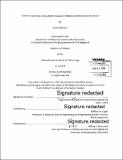Thermo-mechanical stress relief analysis in PMMA and 6000 series aluminum
Author(s)
Stephens, Scott, S.B. (Scott A.). Massachusetts Institute of Technology
DownloadFull printable version (2.289Mb)
Alternative title
Thermo-mechanical stress relief analysis in polymethyl methacrylate and 6000 series aluminum
Other Contributors
Massachusetts Institute of Technology. Department of Materials Science and Engineering.
Advisor
Thomas W. Eagar.
Terms of use
Metadata
Show full item recordAbstract
Stress relief of materials produced in bulk is a key part of the manufacturing process. The most common kinds are either thermal or mechanical and are commonly applied to commercial metal alloys. A third type, thermo-mechanical, utilizes thermal gradients to induce residual stresses of an equal and opposite nature to balance compressive and tensile stresses existing in the material after solutionizing. The experiment detailed in this work shows the effect of thermal gradients on residual stresses in polymethyl methacrylate (PMMA). A downhill quench from 95 C to 15C is able to create a deflection of 2.36 millimeters, evidence of residual stress. A subsequent uphill quench from -40 to 100 degrees reduced the deflection by 37 percent. The finite element simulation of a 6000 series aluminum block verifies that under properly controlled processing parameters, it is possible to induce opposite stresses to relieve residual stresses in a quenched material. Additional limitations to the uphill quench technique are detailed in the following work so that thermo-mechanical stress relief may be properly applied to a range of materials.
Description
Thesis: S.B., Massachusetts Institute of Technology, Department of Materials Science and Engineering, 2014. Cataloged from PDF version of thesis. Includes bibliographical references (page 32).
Date issued
2014Department
Massachusetts Institute of Technology. Department of Materials Science and EngineeringPublisher
Massachusetts Institute of Technology
Keywords
Materials Science and Engineering.